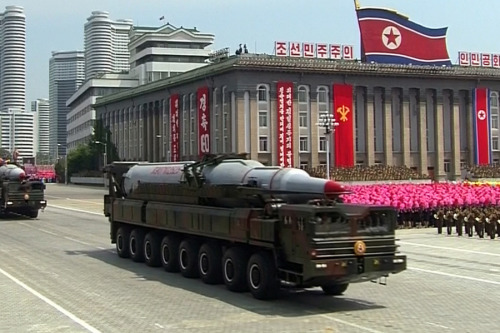


China’s Foreign Minister Wang Yi commented on the possibility of war on the Korean Peninsula when meeting the press with his German counterpart, Sigmar Gabriel, in Berlin on April 26.
“We can’t risk even a 1 percent possibility of war. The Korean Peninsula is not the Middle East. If a war breaks out, there would be unimaginable consequences,” he said. “All parties should follow relevant resolutions passed by the UN Security Council. China calls on all parties to avoid any actions that would escalate the situation."
In a commentary published on April 28 in the People’s Daily Overseas Edition, it was pointed out that this is a crucial moment for all parties involved. The DPRK disrupted the nuclear non-proliferation regime and went against resolutions adopted by the UN Security Council. Meanwhile, the U.S. and South Korea pose a military threat to the DPRK, and seek further sanctions to and isolation for it.
This situation is fragile and dangerous. Should any individual incident occur, it could lead to disastrous consequences on the peninsula and its surrounding areas. Wars and conflicts in the Middle East have already become an open wound for humanity. Another war on the Korean Peninsula would only bring a much worse scenario to Northeast Asia, the commentary continued.
However, despite the existence of tensions on the peninsula, a war is by no means imminent. Although U.S. President Donald Trump and his government did blast the DPRK for its nuclear program and ballistic missiles, and although the DPRK fought back with strong words and actions, there are still encouraging signs. In recent days, the DPRK hasn’t conducted any new nuclear tests. And on April 26, the U.S. secretary of state, secretary of defense and director of national intelligence made a joint statement, claiming that negotiation is still on the table.
According to the commentary, there is no silver bullet to solve the North Korean nuclear issue. Nevertheless, every country in the region wishes to safeguard its own national security and address this issue peacefully. Force will lead nowhere; dialogue and negotiations remain the only solution. It is imperative that all relevant parties consider China’s proposal: the suspension of nuclear tests by the DPRK and the termination of joint military exercises by the U.S. and South Korea.
More strong words and military confrontations will benefit neither the U.S. nor the DPRK. If both sides can send positive signals to each other, the issue might just have a chance at resolution.
 Fire brigade in Shanghai holds group wedding
Fire brigade in Shanghai holds group wedding Tourists enjoy ice sculptures in Datan Town, north China
Tourists enjoy ice sculptures in Datan Town, north China Sunset scenery of Dayan Pagoda in Xi'an
Sunset scenery of Dayan Pagoda in Xi'an Tourists have fun at scenic spot in Nanlong Town, NW China
Tourists have fun at scenic spot in Nanlong Town, NW China Harbin attracts tourists by making best use of ice in winter
Harbin attracts tourists by making best use of ice in winter In pics: FIS Alpine Ski Women's World Cup Slalom
In pics: FIS Alpine Ski Women's World Cup Slalom Black-necked cranes rest at reservoir in Lhunzhub County, Lhasa
Black-necked cranes rest at reservoir in Lhunzhub County, Lhasa China's FAST telescope will be available to foreign scientists in April
China's FAST telescope will be available to foreign scientists in April "She power" plays indispensable role in poverty alleviation
"She power" plays indispensable role in poverty alleviation Top 10 world news events of People's Daily in 2020
Top 10 world news events of People's Daily in 2020 Top 10 China news events of People's Daily in 2020
Top 10 China news events of People's Daily in 2020 Top 10 media buzzwords of 2020
Top 10 media buzzwords of 2020 Year-ender:10 major tourism stories of 2020
Year-ender:10 major tourism stories of 2020 No interference in Venezuelan issues
No interference in Venezuelan issues
 Biz prepares for trade spat
Biz prepares for trade spat
 Broadcasting Continent
Broadcasting Continent Australia wins Chinese CEOs as US loses
Australia wins Chinese CEOs as US loses